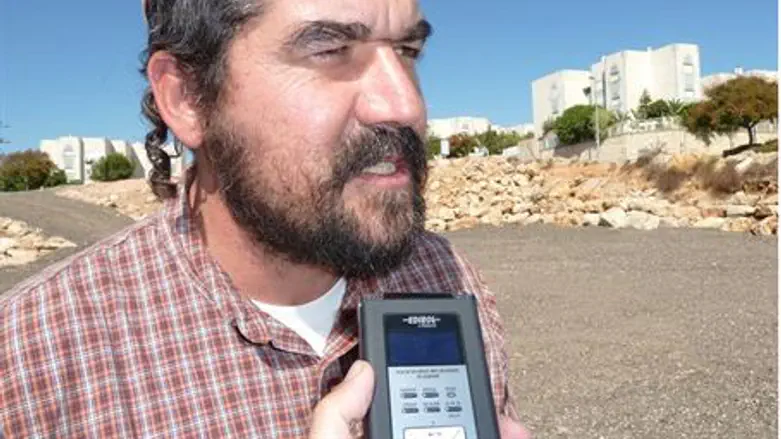
David Ha’ivri, executive director of the Shomron Liaison Office, has just one question for the United Church of Canada (UCC), which is planning to boycott Jewish business in Samaria: “Do you realize what you’re doing?”
Ha’ivri, who spoke to the weekly Canadian Jewish newspaper The Jewish Tribune, explained that a successful boycott of Israeli products made in Judea and Samaira willl harm Palestinian Authority Arabs, the very people the UCC claims it wants to help.
For example, he said, Barkan Industrial Park in Ariel in Samaria is an ecologically friendly area, featuring well-tended parks and gardens tucked in amongst 140 factories. The factories employ 6,000 people – roughly half of whom are Israeli citizens (both Jews and Arabs) and the other half are Palestinian Authority Arabs.
“All of the Palestinians who work in all of the factories are protected by Israeli law,” said Ha’ivri. “They receive the same salaries and the same benefits. Whatever an Israeli employee receives, the Palestinian employee receives.”
He noted that all those employed in the Jewish communities of Judea and Samaria earn a base salary about three times higher than they would earn in communities controlled by the PA, a crucial factor as many PA Arabs have large families. A worker who loses his ‘settlement’ job will have a hard time finding employment in the PA-controlled areas and any job he does find will pay much less.
“When you say ‘boycott the products that are manufactured in the settlements,’ 50 per cent of factory workers are Palestinian, so who are you going to put out of a job? If a factory is being boycotted and they’re losing business, what are they going to do? The boycott movement is not considering that and, in my opinion, they don’t care.”
The United Nations Security Council recently drew attention to the severe financial difficulties within the Palestinian Authority, and Ha’ivri warned that if large numbers of PA Arabs become destitute as a result of BDS, the PA will not be able to help them financially and this will drive them into the arms of Hamas.
“Hamas’s branch of goodwill provides funds for poor people in the PA who have no source for their own income. If they put people out of jobs they’re going to force those same people to turn to Hamas to feed them,” he said.
A panel established by the UCC recently issued a report that proposes a boycott of all products from Jewish settlements, but not from other areas of Israel, arguing the settlements are illegally eating away ‘Palestinian lands.’
A group of nine Canadian senators recently warned the UCC that a boycott of Israeli goods from Judea and Samaria could spark a rift with the Jewish State.
The senators, from both the Conservative and Liberal parties, are all members of the United Church. They warned the panel that the distinction drawn with the narrower boycott will “be lost upon” Israelis and Canada’s Jewish community, who will see it as an anti-Israel measure.
Prominent Jewish leaders have asserted behind the idea is the vehement anti-Israel minority in the UCC that is tarnishing the reputation of the church.
“Israel has become an obsession for a small vocal group,” said Shimon Fogel, CEO of the Centre for Israel and Jewish Affairs. “I think frankly it betrays the sensibilities of the vast majority of ordinary members of the United Church.”
PA Arabs, of course, would not dare to voice their fear of losing employment in Jewish firms and if asked, would likely say that they are willing to suffer, as is borne out by the UCC's reaction below:
The Jewish Tribune contacted Bruce Gregersen, general council officer, programs for mission and ministry, at the UCC. He was asked if he and the members of the working group were aware of the facts and potential consequences as presented by Ha’avri; if so, why did they ask for a boycott and, if not, whether they would reconsider it pending further investigation.
“Your questions presume that the Working Group reached a decision to call for economic actions against settlement products on its own,” Gregersen told The Jewish Tribune in an email. “In fact, it is responding to a request from Palestinian Christians for this action. Palestinians are well aware of the implications of the call and indeed are the only ones who can determine that it is worth doing.
“As you are aware, Palestinian civil society has called for full Boycott, Divestment and Sanctions against Israel,” he added. “The Working Group chose not to go there for the reasons outlined in the report. Palestinian Christians instead have called for a boycott of the ‘products of the occupation.’ The Working Group understands this as meaning the products of settlements. Again the Working Group is confident that Palestinian Christians themselves have weighed the implications of this call and have chosen to support it.”
Reprinted with permission of the Jewish Tribune in Toronto, with files from Arutz Sheva.